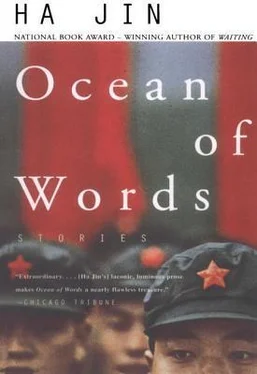Song Ang got up and moved close. “What’s wrong, Jee?”
“Oh, oh I busted my stomach!”
Squad Leader Lu climbed out of bed and went up to him. “Roll over.” He helped him turn prone. “There, try to throw up. Throw up as much as you can.”
“Oh I can’t. My throat is clogged. Oh, oh —” Jee was sweating all over; his lips were purple and his face as pale as wax. Squad Leader Lu staggered out to call for an ambulance.
We were scared out of our drunkenness and gathered around, but all we could do was spread a cold, wet towel on his forehead. Meanwhile, he never stopped groaning and twitching. “Jee, are you all right?” Wu asked.
No answer. We thought he was dying. I remembered a soldier in the other recruit company who had stuffed himself to death with mutton dumplings and apples. His stomach had been as big as a basin when the doctor had taken it out.
The ambulance came and took Jee to the Regimental Infirmary. Our company’s medic went with him, while we waited anxiously to hear about his condition. Late that night we were informed that Jee was out of danger. I thought they would cut him open, but they didn’t. Instead they made him drink a lot of soybean oil to induce him to vomit, and they also gave him enemas. Though stable now, he had to be kept under observation for a few days.
Before we set out for our new units the next day, we had no chance to say good-bye to Jee. Every one of us donated a yuan , a sixth of our monthly allowance. Since they both were to stay at the Regimental Headquarters, Squad Leader Lu Hai and Wu Desheng would buy whatever they thought appropriate with the money and visit Jee Jun on our behalf. They were to tell him that we all would like to keep in touch with him.
The farewell dinner had provided those poetic brains with rich material for another couplet. With ease they completed the doggerel, which now went:
Miss Jee toured the borderline
With the fly open on her behind.
Miss Jee threw a hand grenade
Only to have her looks remade.
Miss Jee, loving noodle soup,
Dived into a caldron in a swoop.
Miss Jee, tiny appetite,
Cried for a bun in a fight.
Miss Jee, drinking like a whale,
Still can’t prove she is a male.
Everybody was impressed by the rhyme in the last couplet. We all wrote the poem down in our notebooks, as though it was our common heritage, which we would carry to the battlefield.
Again it was time for studying the Party’s history. Secretary Si Ma Lin of the Radio Company had to rewrite his lectures, because the significance and nature of some events in the textbook changed each year. For example, the year before, Lin Biao had been “the Wise Marshal,” but the next year he became a traitor throughout the history of the Chinese Communist Party. If only there were a definitive textbook, then Si Ma would be able to prepare his lectures once and for all. That would save him a lot of time.
Recently he was tickled by an idea. It was said that a retired cadre, Liu Baoming, had been a participant in the Long March. Why not invite him to talk to the company? To begin this year’s study with a vivid lecture would at least arouse the soldier’s interest in the Party’s history. In addition, Si Ma felt that there might be something worth writing in the old revolutionary’s experience. He would take down what the old man said. If lucky, he might be able to cast the talk into an article and have it published somewhere. That would be a good way of showing the caliber of his pen to his superiors in the Divisional Political Department.
He discussed the matter with Company Commander Pei Ding. Though lukewarm about the idea, Pei agreed to have Old Liu over. The two company leaders were on uneasy terms because Si Ma was one rank higher than Pei, earning nine yuan more a month.
Si Ma went to Liu’s house, which was just a few blocks away from the barracks, to invite Liu officially. The old man agreed to come, and Si Ma promised that he would send an automobile to pick him up at one-thirty on Friday afternoon.
On Thursday, Si Ma called the Divisional Headquarters to arrange a jeep for Liu, but he was told that nothing would be available on Friday. Fortunately, the Radio Company had a Yellow River truck that could carry eight tons, so he dispatched it to the Lius’ the next day.
After the soldiers took their seats in the meeting room, Si Ma went to the front and said, “Comrades, this is our first lecture on the Party’s history. Our company is very fortunate today to have an old Red Army man to talk to us about the Long March. First, let me introduce to you Comrade Liu Baoming.” He raised his hand politely, palm to the ceiling, pointing at the guest on a front seat. His chin also jutted at him.
Liu’s white head rose before the soldiers. Many of them were surprised to find that the Red Army man was the small man who played chess with those retired workers near the entrance of the Divisional Headquarters every day. Liu gave a smile to the audience, waving his shriveled hand sideways. He sat down.
“As you all know” — Si Ma spoke again — “the Long March is a heroic epic that shocked the whole world. Our Great Leader Chairman Mao led the Red Army to climb the snow mountains, cross the grass marshes, fight the warlords’ troops and Chiang Kai-shek’s armies, and trek through eleven provinces; all together they walked twenty-five thousand li . The Long March saved our army, our Party, our revolution, and our country. When it started from Jiangxi Province in 1934, the Red Army had over three hundred thousand men; but when it reached Northern Shanxi the next year, there were only thirty thousand left. Comrades, so many Revolutionary Martyrs sacrificed their precious young lives for the liberation of the Chinese people. Today, four decades later, only hundreds of the Long March participants are alive in China. Our honored guest today, Comrade Liu Baoming, is one of them.
“Comrades, we must cherish this opportunity to learn about our Party’s glorious history. We must listen to him carefully and take down everything he says. Now, let us welcome Comrade Old Liu.”
In a storm of applause, the old man walked to the front and sat down at the desk. The orderly went over and poured him a cup of green tea. The room grew quiet as over one hundred pairs of eyers were fixed on Liu’s sallow, wrinkled face.
“Sons,” Liu said, “Little Si Ma wanted me to talk to you boys about the Long March. All right, I agreed. So I came. Now, let me first tell you how I joined the Red Army. It was in the spring of 1935, when I was seventeen. The Red Army came to my hometown, Mingyi, and took all the land from the landlords, and gave it to us poor folks. This means I wasn’t in the Red Army when the Long March started, and I joined in when it passed our place.”
The rustling of pens could be heard in the room. Si Ma wrote in his notebook, “Joined 1935, age 17.”
Liu paused and looked at the swarm of dark heads. He resumed, “Why did I join the Red Army? Well, ’cause I could have something to eat. Dad and I went into the mountains to carry down firewood and sold it in town. The work was hard, and we never had enough food and clothes. Then the Red Army came. They caught the rich men and let the poor folks share out their wealth and land. Good, those parasites had to be wiped out. At long last, we, the oppressed men and women, could straighten up our spines and let out our anger. We took those fat landlords to a riverside and stoned them to death one by one. I was convinced that the Reds were our poor folks’ army, so I joined in. For the first time, I had enough warm rice in my stomach and new clothes on my body. Two weeks later, I left home with the Red Army, for good.”
Читать дальше











